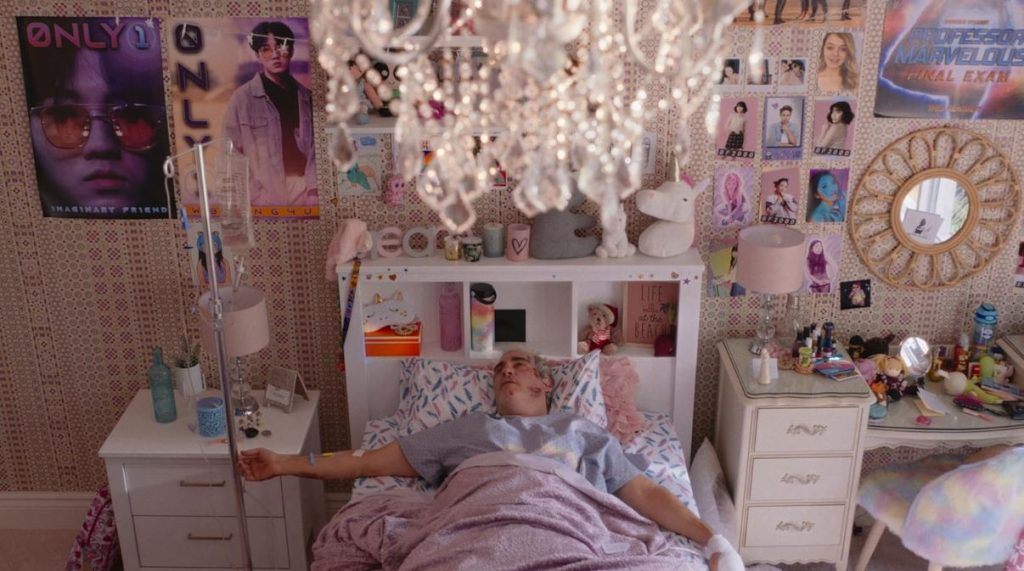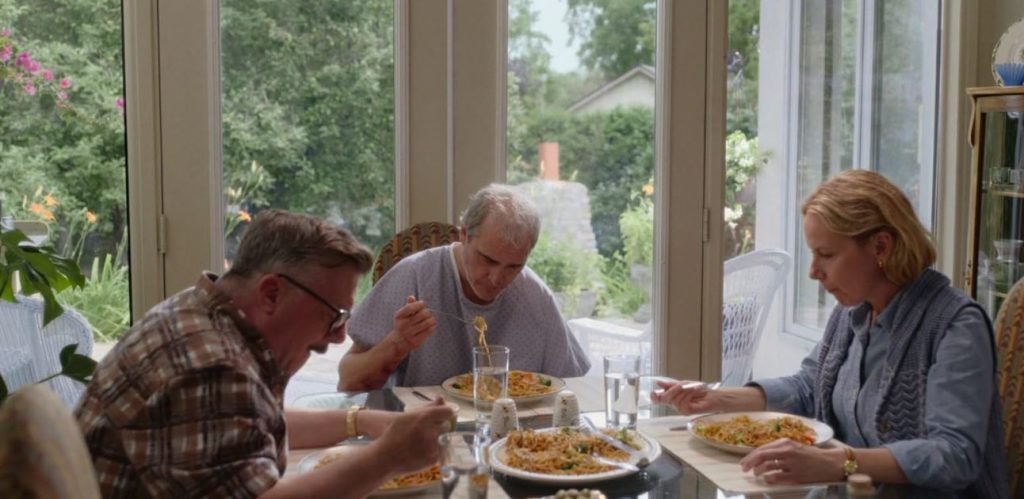
Beau is fucked, is what he is. Right from birth, when he is dropped by the doctor delivering him. The doctor denies it, but Beau’s overbearing, quintessentially Jewish mother, Mona (played by Zoe Lister-Jones in flashbacks from Beau’s childhood, and Patti LuPone when he is an adult), knows the truth. This is far from the only possible head trauma Beau Wassermann (Joaquin Phoenix as an adult, Arman Nahapetian in the flashbacks) will suffer throughout the three hours we spend with him. In fact, each of the movie’s first two hours ends with Beau being struck unconscious and waking to a new and unsettling reality.
We begin on a visit to Beau’s therapist (Stephen McKinley Henderson), whose smiling, warm demeanor does nothing to change the fact that his every word only adds to Beau’s already overwhelming anxieties, not least of which is the following day’s flight home to visit his mother. The therapist prescribes Beau a “cool new drug” for these anxieties, but stresses the importance of always taking it with water. For a guy like Beau, who worries that swallowing mouthwash once or twice could give him stomach cancer, this is certain only to add to his worries.
Beau lives in an urban hellscape straight out of the worst conservative’s worst nightmares, surrounded by chaos and violence, forced to run at top speed into his apartment building each evening in order to avoid the hordes of beggars, vagrants, thieves and murderers that plague the corpse-strewn streets. When he contemplates leaving his home in broad daylight, a maniac holds grinning eye contact with him through the window as he gouges the eyes of a screaming man lying in the street. Graffiti in the building’s lobby reads: “HAIL SATAN SHOOT DOPE KILL CHILDREN FUCK THE POPE.” The signage for Erectus Ejectus, the peep show next door to his building is similarly hilarious (“PUSSY DRINK WATER” “PUSSY WRITE LETTER” “KNIFE DICK (STAB OTHER MAN)”), and just another example of the many great visual gags sprinkled throughout the movie.

There are reports of a nude man going around stabbing people in the neighborhood, and signs warning of a brown recluse spider loose in the building. Of course, he is doomed to encounter both; the spider has already made its way into Beau’s apartment, which is shabby and depressing. As he tries to sleep, he is repeatedly awakened by notes slid under his door begging him to turn down the music he is absolutely not playing. It escalates until the unknown neighbor is blasting music of his own in retaliation, causing Beau to miss the alarm he set for the morning. Now he’s scrambling to make it to the airport in time for his flight and, when he leaves his luggage in the hallway and keys in his door just long enough to run and retrieve the dental floss he forgot to pack (undoubtedly fearing gum cancer if he misses a day or two), of course both luggage and keys are gone when he returns. “You’re fucked,” a maintenance man chuckles as he walks by the distraught Beau.
This is the stressful brilliance of even just the first act of Ari Aster’s latest masterpiece. Everything you ever feared could go wrong in your everyday existence is constantly going wrong. When the water is shut off in your apartment building and you run, keyless, to the convenience store across the street for some bottled water so you don’t die from the medication you just took, every derelict in the neighborhood immediately wanders into the building ahead of you, and where would they go after they remove the phone book you used to prop the door but right up to your apartment, leaving you to spend the night on the fire escape, watching as they lay waste to your meager home. In another example of the glorious detail Aster brings to every frame, one degenerate obsessively washes the dishes with twitchy, meth-like diligence.

Beau awakes from his urban nightmare into a garish pink suburban one, the kind of hell that seems like heaven until you realize you’re trapped there. He has been rescued by Roger (Nathan Lane) and Grace (Amy Ryan), who live with their moody, inscrutable teenage daughter, Toni (Kylie Rogers), and a severely traumatized former soldier named Jeeves (Denis Menochet) who served with their dead soldier son. They have basically adopted Jeeves and seem to want to adopt Beau as well, and the eerie cheerfulness of their home and attitude is reminiscent of the “kindly couple” in the underrated 2006 thriller Running Scared, its most memorable sequence.
Beau’s guilt-ridden quest to reach his mother’s home only gets darker, stranger and more surreal as it goes on, taking him from urban to suburban nightmares, through a soothingly animated fable of his own possible alternate life, and inevitably to the ultimate nightmare revelation of all his buried family secrets. As always, Phoenix brings everything he has to his performance, and Beau is a sad-sack for the ages, a perfect vehicle for all the family-based guilt and trauma Aster has been exploring since his first short film. With Beau Is Afraid, he’s made his funniest and most fascinating feature, an endlessly rewatchable journey through a tortured subconscious. This is a movie that really gets in your head. I will never, for example, leave my keys in the door unattended again.
Leave a Reply